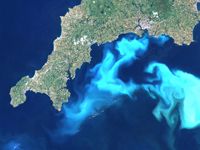Difference between revisions of "Portal:Eutrophication/Intro"
From Coastal Wiki
| Line 1: | Line 1: | ||
[[Image:Sack.jpg|right|thumb|<small>Algal bloom</small>]] | [[Image:Sack.jpg|right|thumb|<small>Algal bloom</small>]] | ||
| − | + | ||
| − | + | Eutrophication is one of the causes of the deterioration of water quality. In the North Sea and English Channel, this phenomenon is related to two major activities: agriculture and industry. This gives an excess of nutrients (nitrates, phosphates,...) in the water. This enrichment promotes the growth of algae. A small increase in algal biomass does not have any adverse effect on the ecosystem and can even result in an increase in certain fish populations. An over-stimulation of the growth of algae, however, can lead to turbidity of the water. When the algae die, the water may be temporarily low in oxygen (hypoxia) what can result in the death of many fish. | |
| − | |||
| − | |||
Revision as of 11:43, 14 August 2012
Eutrophication is one of the causes of the deterioration of water quality. In the North Sea and English Channel, this phenomenon is related to two major activities: agriculture and industry. This gives an excess of nutrients (nitrates, phosphates,...) in the water. This enrichment promotes the growth of algae. A small increase in algal biomass does not have any adverse effect on the ecosystem and can even result in an increase in certain fish populations. An over-stimulation of the growth of algae, however, can lead to turbidity of the water. When the algae die, the water may be temporarily low in oxygen (hypoxia) what can result in the death of many fish.
